10/04/2016 - 10:27 am
0
Training workshop aims to enhance capacities of NGOs in community development and stakeholders in public health related policy development based on scientific evidences; and encourage scientists and policy makers to implement and comply ethics in research and public health related policy development
On April 7-8th, 2016, Evidence-base Health Policy Development Advocacy Coalition (EBHPD), Vietnam Ban Asbestos Network (Vn-BAN), Vietnamese non-communicable diseases Alliances (NCDs-VN) and Vietnam Public Health Association (VPHA) in collaboration with International Joint Policy Committee – Society of Epidemiology (IJPC-SE), International Ban Asbestos Secretariat (IBAS) and Southeast Asia Tobacco Control Alliance (SEATCA) held a training workshop on “Ethics in Research, public policy advocacy and health related policy development”.
Facilitators for the training workshop were all experts from public health related policy advocacy: Dr. Colin Soskolne – Chairman of IJPC-SE, Mr. Rob Moore – Communication Specialist, Ms. Bugon Rithiphakdee- Executive Director of SEATCA, Dr. Tran Tuan – Head of taskforce group of EBHPD, NCDs-VN and Vn-BAN, Dr. Pham Hoang Anh – Director of Health Bridge Canada Vietnam office, Dr. Do Quoc Quang (Expert of Vn-BAN). Chair of Father Front in Ha Nam Province, representatives of governmental agencies in the process of policy development, civil society organizations and media participated in this workshop.
International and Vietnamese experts emphasized the role of scientific evidence in the process of policy development, especially in the public health related policy. Ethics and corruption were focused on when experts and delegates discussed in depth the asbestos ban in 2020 policy and tobacco control policy. These two policies were used as case studies for interferes of interest groups in the process of public health related policy development. Experts listed out pseudo-scientific evidence these industries used to influence policy makers in Vietnam. Speakers also mentioned about ethics in communication for policy advocacy.
Dr. Colin L. Soskolne (IJPC-SE) presented 4 major issues: Health disparities and ethics, integrity in epidemiology as the science basic to rational public health policy, Asbestos of all fiber- types: Decade of science, influence, deceit and harm, and the influences of interest groups in policy development in global level. Dr. Colin analyzed extensively the asbestos ban policy and evidence of ethical violation from the asbestos industry’s inferences on a global scale. He said: “The fact is that the global asbestos industry and its lobby groups have spent millions of US dollars over the years to ruin and manipulate scientific evidence regarding asbestos (including chrysotile asbestos). These toxics causes of cancer and asbestos-related diseases for workers who directly participate in mining and processing products containing asbestos, as well as residents living in a fibro-asbestos environment.”
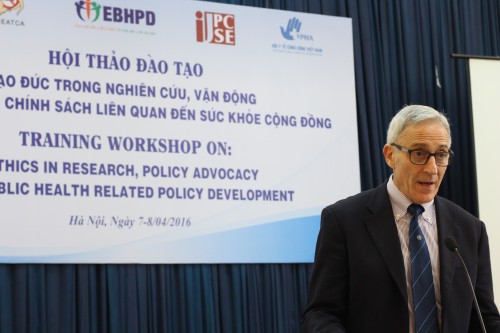
Dr. Colin L. Soskolne, chair of International Joint Policy Commitee-Society Epidemiology
Exposing the role of pro-asbestos interest groups in biased, deceptive and manipulated studies and public health related policy development, Dr. Colin believes thatWHO should adopt a similar framework convention to that of the Framework Convention on Tobacco Control (FCTC): “This is a transnational agreement with the aim to seek solutions to protect our and future generations from health, social, environmental and economic devastation of tobacco consumption and its smoke.”
He also noted, although we cannot argue the widespread scientific evidence concerning the impact of tobacco, this industry took advantage of the economic risk of FCTC to block the draft of FCTC. However, WHO provided information confirming that tobacco control policy cannot harm the economy.
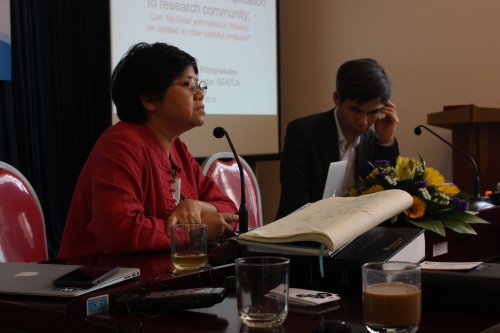
Ms. Bungon Ritthiphakdee, Executive director of Southeast Asia Tobacco Control Alliance
Sharing the same opinion, Ms. Bungon Ritthiphakdee, Executive director of SEATCA said: “Every 6 seconds a person will die as a result of smoking. Tobacco kills6 million people annually worldwide (including 600.000 deaths from inhaling smoke). These statistics are significantly more than total number of deaths due to hepatitis, HIV/AIDS and malaria. If action is not taken immediately, by 2030 it is expected that 8 million people will die because of smoke each year, with 80% people residing in developing countries. The total profits of 6 tobacco companies are $US35 billlion dollars. This is equivalent to the combined profits of CocaCola, Microsoft and McDonalds. “The tobacco industry makes an enormous profit and kills half of the people consuming it”. Ms. Bungon Ritthiphakdee highlighted this fact, and said that it is the reason why we must not compromise with the tobacco industry, and serves as an important reminder when dealing with other toxic industries.
Dr. Pham Hoang Anh, Director of Health Bridge Vietnam provided evidence on the tobacco industry’s inference in Vietnam, regarding advocacy and delaying or suspending a tax increase. Despite the truth, contribution from the tobacco industry on the government budget is considerably less than smoker expenses (14.000 billion in 2011 versus 22.000 billion in 2012) and health expenses for the treatment of 5 key diseases caused by tobacco (24.000 in 2012).
One of the prevailing challenges for health specialists working on prevention, comes from the tobacco industry’s constant interference in public health policy in Vietnam, and consequently the government did not implement Article 5.3 – FCTC. The tobacco industry is state-owned property, many leaders in the tobacco industry become high-position officers in Ministry of Trade and Industry and vice versa. This causes a conflict of interest in policy development and implementation, and illustrates a weak commitment from government in protecting public health policy from big tobacco industry interference.
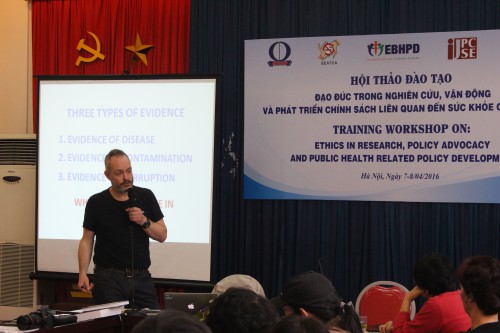
Mr. Rob Moore, a film producer and communication expert
Mr. Rob Moore, a film producer and communication expert from the UK showcased international asbestos documentaries including an interview with Dr. Maria Neria – Board Manager of Environment and Public Health (WHO). Dr. Neria emphasized the asbestos threat to public health, and championed WHO’s actions in the asbestos ban policy andworldwide advocacy, along with 12 Vimeo experts. There are two films produced by WHO with Vietnamese subtitles. “Voices of Southeast Asia” and “Chrysotile Asbestos”.
Mr. Rob Moore credits these documents in assisting journalists in their understanding of the lethal hazards of all types of asbestos, including chrysotile asbestos. We also hope it assists in their understanding of the working practices of the asbestos industry, the millions of deaths that have now been caused globally by asbestos, and the sometimes criminal behavior that has caused these deaths and led to asbestos manufacturers being prosecuted in courts around the world.
In the last workshop (April 8th, 2016), EBHPD’s members and delegates held group discussions to draw on framework programs with the aim to enhance the capacity of coalition member organizations in ethics, policy advocacy and communication for policy advocacy.
Here are some pictures of training workshop:
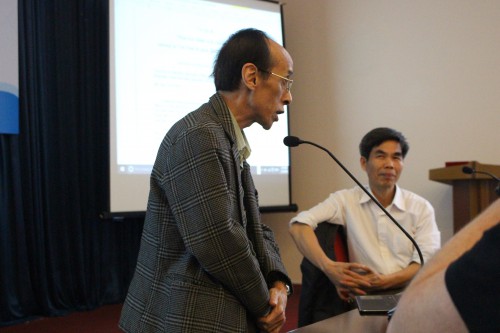
Dr. Do Quoc Quang- expert of Vn-BAN
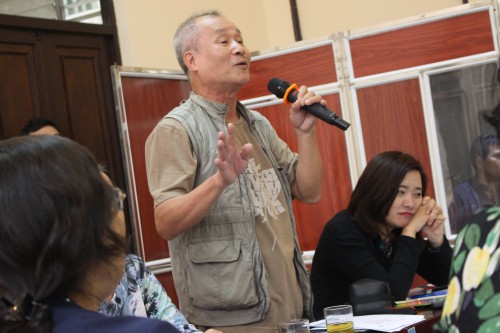
Mr. Vu The Long- expert of Vn-BAN
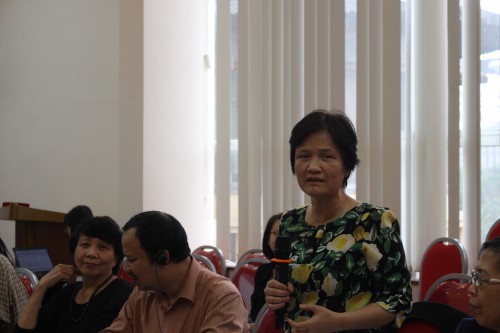
Dr. Do Thi Van, director of NGO-IC, member of Vn-BAN
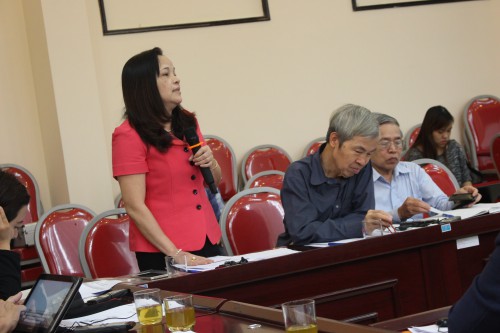
Chair of Vietnamese Father Front in Ha Nam Province
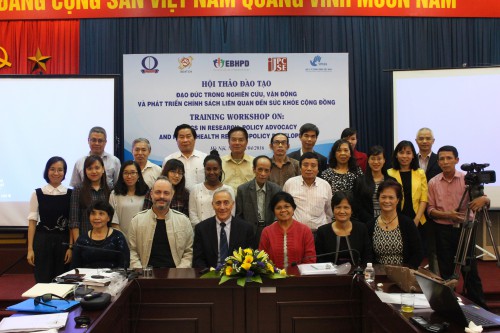
Facilitators and delegates in training workshop